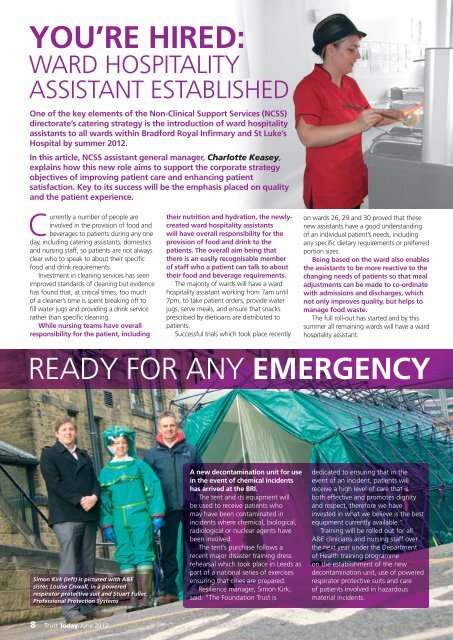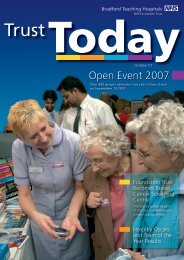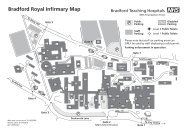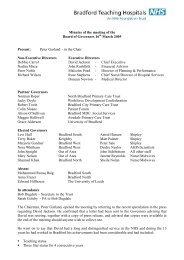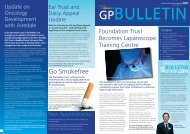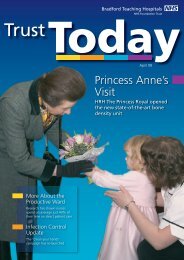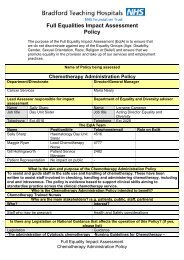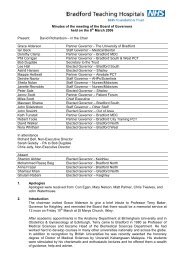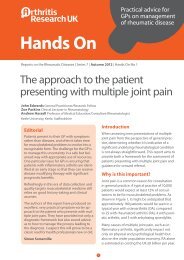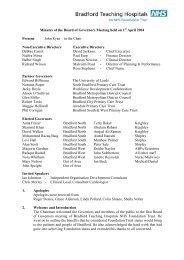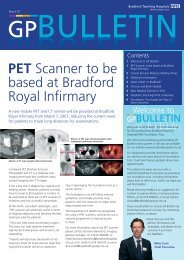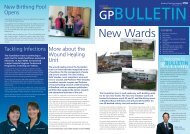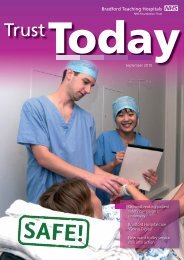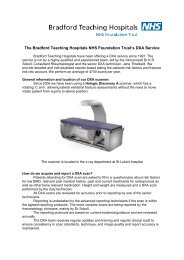Trust Today June 2012 - Bradford Teaching Hospitals
Trust Today June 2012 - Bradford Teaching Hospitals
Trust Today June 2012 - Bradford Teaching Hospitals
You also want an ePaper? Increase the reach of your titles
YUMPU automatically turns print PDFs into web optimized ePapers that Google loves.
YOU’RE HIRED:<br />
WARD HOSPITALITY<br />
ASSISTANT ESTABLISHED<br />
One of the key elements of the Non-Clinical Support Services (NCSS)<br />
directorate’s catering strategy is the introduction of ward hospitality<br />
assistants to all wards within <strong>Bradford</strong> Royal Infi rmary and St Luke’s<br />
Hospital by summer <strong>2012</strong>.<br />
In this article, NCSS assistant general manager, Charlotte Keasey,<br />
explains how this new role aims to support the corporate strategy<br />
objectives of improving patient care and enhancing patient<br />
satisfaction. Key to its success will be the emphasis placed on quality<br />
and the patient experience.<br />
Currently a number of people are<br />
involved in the provision of food and<br />
beverages to patients during any one<br />
day, including catering assistants, domestics<br />
and nursing staff, so patients are not always<br />
clear who to speak to about their specifi c<br />
food and drink requirements.<br />
Investment in cleaning services has seen<br />
improved standards of cleaning but evidence<br />
has found that, at critical times, too much<br />
of a cleaner’s time is spent breaking off to<br />
fi ll water jugs and providing a drink service<br />
rather than specifi c cleaning.<br />
While nursing teams have overall<br />
responsibility for the patient, including<br />
their nutrition and hydration, the newlycreated<br />
ward hospitality assistants<br />
will have overall responsibility for the<br />
provision of food and drink to the<br />
patients. The overall aim being that<br />
there is an easily recognisable member<br />
of staff who a patient can talk to about<br />
their food and beverage requirements.<br />
The majority of wards will have a ward<br />
hospitality assistant working from 7am until<br />
7pm, to take patient orders, provide water<br />
jugs, serve meals, and ensure that snacks<br />
prescribed by dieticians are distributed to<br />
patients.<br />
Successful trials which took place recently<br />
on wards 26, 29 and 30 proved that these<br />
new assistants have a good understanding<br />
of an individual patient’s needs, including<br />
any specifi c dietary requirements or preferred<br />
portion sizes.<br />
Being based on the ward also enables<br />
the assistants to be more reactive to the<br />
changing needs of patients so that meal<br />
adjustments can be made to co-ordinate<br />
with admissions and discharges, which<br />
not only improves quality, but helps to<br />
manage food waste.<br />
The full roll-out has started and by this<br />
summer all remaining wards will have a ward<br />
hospitality assistant.<br />
READY FOR ANY EMERGENCY<br />
Simon Kirk (left) is pictured with A&E<br />
sister, Louise Croxall, in a powered<br />
respirator protective suit and Stuart Fuller,<br />
Professional Protection Systems<br />
8 <strong>Trust</strong> <strong>Today</strong> <strong>June</strong> <strong>2012</strong><br />
A new decontamination unit for use<br />
in the event of chemical incidents<br />
has arrived at the BRI.<br />
The tent and its equipment will<br />
be used to receive patients who<br />
may have been contaminated in<br />
incidents where chemical, biological,<br />
radiological or nuclear agents have<br />
been involved.<br />
The tent’s purchase follows a<br />
recent major disaster training dress<br />
rehearsal which took place in Leeds as<br />
part of a national series of exercises<br />
ensuring that cities are prepared.<br />
Resilience manager, Simon Kirk,<br />
said: “The Foundation <strong>Trust</strong> is<br />
dedicated to ensuring that in the<br />
event of an incident, patients will<br />
receive a high level of care that is<br />
both effective and promotes dignity<br />
and respect, therefore we have<br />
invested in what we believe is the best<br />
equipment currently available.”<br />
Training will be rolled out for all<br />
A&E clinicians and nursing staff over<br />
the next year under the Department<br />
of Health training programme<br />
on the establishment of the new<br />
decontamination unit, use of powered<br />
respirator protective suits and care<br />
of patients involved in hazardous<br />
material incidents.


